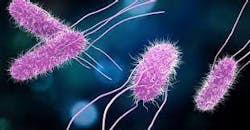Swiss Researchers Using E. coli to Generate Electricity and Treat Wastewater
Escherichia coli, better known as E. coli, is a bacteria commonly associated with food poisoning and food contamination. But, within this troublesome organism may be the next evolution in energy production and wastewater treatment.
While E. coli is naturally capable of producing electricity, it can only do so when certain chemicals are present. However, researchers at the Swiss Federal Institute of Technology Lausanne (EPFL) were able to successfully enhance this natural ability by re-engineering the bacteria to increase its electric generation effectiveness while enhancing its ability to metabolize a variety of organism substrates.
To achieve this, researchers integrated parts of Shewanella oneidensis MR-1, a bacteria known for generating electricity and absorbing heavy metals, into E. coli. This created a pathway that led to a three-fold increase in electrical current generation when compared to conventional methods.
“We engineered E. coli bacteria, the most widely studied microbe, to generate electricity,” said Professor Ardemis Boghossian at EPFL. “E. coli can grow on a wide range of sources, which allowed us to produce electricity in a wide range of environments, including from wastewater.”
The modified E. coli is also showing promising potential as a large-scale waste treatment tool. In addition, the bacteria’s genetic flexibility means it can be altered to thrive in a variety of feedstocks and environments.
"Instead of putting energy into the system to process organic waste, we are producing electricity while processing organic waste at the same time -- hitting two birds with one stone," says Boghossian. "We even tested our technology directly on wastewater that we collected from Les Brasseurs, a local brewery in Lausanne. [We found] our bioengineered electric bacteria were able to flourish exponentially by feeding off this waste."
About the Author
Breanna Sandridge, Senior Editor
Breanna Sandridge is senior editor for EnergyTech and Microgrid Knowledge, both part of the energy group at Endeavor Business Media.
Prior to that, Breanna was managing editor for Machinery Lubrication and Reliable Plant magazines, both part of Noria Corp. She has two years experience covering the industrial sector.
She also is a 2021 graduate of Northeastern State University (Oklahoma) with a Bachelor's in English.
